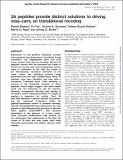Files in this item
2A peptides provide distinct solutions to driving stop-carry on translational recoding
Item metadata
| dc.contributor.author | Sharma, P | |
| dc.contributor.author | Yan, F | |
| dc.contributor.author | Doronina, V | |
| dc.contributor.author | Escuin-Ordinas, Helena | |
| dc.contributor.author | Ryan, Martin Denis | |
| dc.contributor.author | Brown, Jeremy | |
| dc.date.accessioned | 2012-01-26T16:31:03Z | |
| dc.date.available | 2012-01-26T16:31:03Z | |
| dc.date.issued | 2012-04 | |
| dc.identifier | 16670752 | |
| dc.identifier | 620c684d-48c6-4ea2-8a4c-c320becc19bc | |
| dc.identifier | 000303164400035 | |
| dc.identifier | 84860185302 | |
| dc.identifier.citation | Sharma , P , Yan , F , Doronina , V , Escuin-Ordinas , H , Ryan , M D & Brown , J 2012 , ' 2A peptides provide distinct solutions to driving stop-carry on translational recoding ' , Nucleic Acids Research , vol. 40 , no. 7 , pp. 3143-3151 . https://doi.org/10.1093/nar/gkr1176 | en |
| dc.identifier.issn | 0305-1048 | |
| dc.identifier.other | ORCID: /0000-0002-0012-0614/work/47136050 | |
| dc.identifier.uri | https://hdl.handle.net/10023/2227 | |
| dc.description | Funded by the U.K. Biotechnology and Biological Sciences Research Council (BB/E/01070911) | en |
| dc.description.abstract | Expression of viral proteins frequently includes non-canonical decoding events (‘recoding’) during translation. ‘2A’ oligopeptides drive one such event, termed ‘stop-carry on’ recoding. Nascent 2A peptides interact with the ribosomal exit tunnel to dictate an unusual stop codon-independent termination of translation at the final Pro codon of 2A. Subsequently, translation ‘reinitiates’ on the same codon, two individual proteins being generated from one open reading frame. Many 2A peptides have been identified, and they have a conserved C-terminal motif. Little similarity is present in the N-terminal portions of these peptides, which might suggest that these amino acids are not important in the 2A reaction. However, mutagenesis indicates that identity of the amino acid at nearly all positions of a single 2A peptide is important for activity. Each 2A may then represent a specific solution for positioning the conserved C-terminus within the peptidyl-transferase centre to promote recoding. Nascent 2A peptide:ribosome interactions are suggested to alter ribosomal fine structure to discriminate against prolyl-tRNAPro and promote termination in the absence of a stop codon. Such structural modifications may account for our observation that replacement of the final Pro codon of 2A with any stop codon both stalls ribosome processivity and inhibits nascent chain release. | |
| dc.format.extent | 9 | |
| dc.format.extent | 2520313 | |
| dc.language.iso | eng | |
| dc.relation.ispartof | Nucleic Acids Research | en |
| dc.subject | QP Physiology | en |
| dc.subject.lcc | QP | en |
| dc.title | 2A peptides provide distinct solutions to driving stop-carry on translational recoding | en |
| dc.type | Journal article | en |
| dc.contributor.sponsor | BBSRC | en |
| dc.contributor.sponsor | BBSRC | en |
| dc.contributor.institution | University of St Andrews. School of Biology | en |
| dc.contributor.institution | University of St Andrews. Biomedical Sciences Research Complex | en |
| dc.identifier.doi | 10.1093/nar/gkr1176 | |
| dc.description.status | Peer reviewed | en |
| dc.identifier.grantnumber | BB/E010709/1 | en |
| dc.identifier.grantnumber | C20035 | en |
This item appears in the following Collection(s)
Items in the St Andrews Research Repository are protected by copyright, with all rights reserved, unless otherwise indicated.

